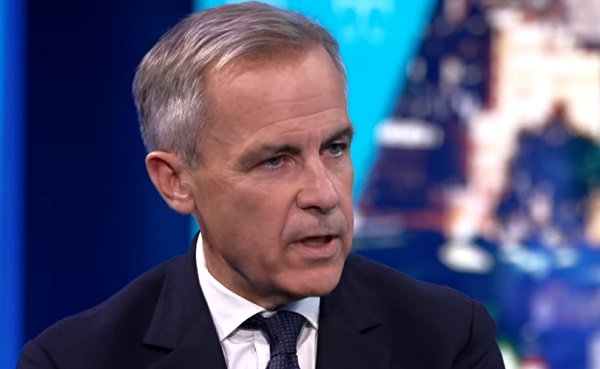DEI
Liberal leadership candidate Mark Carney confirms he will pursue agenda of ‘inclusiveness’

From LifeSiteNews
Liberal leadership candidate Mark Carney, who intends to replace Trudeau, confirmed that ‘while America engages in a war on woke, Canadians will continue to value inclusiveness.’
The top candidate to replace Justin Trudeau as prime minister and Liberal Party leader Mark Carney confirmed he will pursue an “inclusiveness” woke agenda, claiming this is needed to counter U.S. President Donald Trump’s anti-woke agenda.
“There’s a fever gripping America. And while it rages, Canadians will remain resolute and true to our values,” said Carney to reporters Wednesday. “While America engages in a war on woke, Canadians will continue to value inclusiveness.”
Carney’s comments come in light of Trump axing funding to a host of DEI programs, as well as issuing a number of executive orders (EOs) that go against the woke agenda, including orders designed to protect children from chemical and surgical gender mutilation and eliminate gender and critical race theory in eduction.
Carney’s promise to promote “inclusiveness” in Canada in opposition to Trump’s agenda comes only days after Trudeau’s Liberal government promised an extra $41.5 million in taxpayer funds to advance 106 pro-LGBT projects “across Canada.”
Carney, whose ties to globalist groups has had Conservative Party leader Pierre Poilievre call him the World Economic Forum’s “golden boy,” has a history of promoting anti-life and anti-family agendas, including abortion.
The former central banker has also endorsed the carbon tax and even criticized Trudeau when he exempted home heating oil from the tax.
The Liberal Party of Canada will choose its next leader, who will automatically become prime minister, on March 9, after Trudeau announced that he plans to step down as Liberal Party leader once a new leader has been chosen.
Just recently, Carney drew headlines after no less than four journalists from independent media were forcefully barred from attending his Liberal Party leadership candidacy press conference.
Aristotle Foundation
The University of Saskatchewan is on an ideological mission

By Peter MacKinnon
The program is part of an ideological crusade within our universities, one that includes identity-based admissions and faculty appointments, and discourages those who differ from speaking out or taking issue with its direction.
It needs to end
I must disclose my background here; I was employed by the University of Saskatchewan for 40 years including 13 years as president. The institution’s distinctive origins combined the development of liberal education with a responsibility to build the province’s agricultural industry, and it did the latter with world-class agricultural programs and research institutes, and with faculty and students of many backgrounds from around the globe.
Now, we are told, the academic personnel in this worldly environment require mandatory training on racism: an Anti-Racism/Anti-Oppression and Unconscious Bias Faculty Development Program. It is compulsory; those who decline its offerings will be shut out of collegial processes previously thought to be their right as tenured faculty.
It was earlier reported that the program emerged from collective bargaining at the initiative of the university’s faculty union; if so, this does not relieve the administration from responsibility; it signed the collective agreement.
“Program” is a euphemism. It is a propaganda module in which scholarly expertise and balance will not be found. It does not appear that the instructor has a university academic post and the program’s ideological hue is revealed in the two required readings, one by Idle No More co-founder Sheelah McLean whose theme is that the success of Saskatchewan’s white people is built on “150 years of racist, sexist and homophobic colonial practices.”
The second is by five “racialized” faculty who claim that Canadian university systems are rigged to privilege white people. Dissent, contrary views or even nuance are neither expected nor tolerated here. Opinions that are different are not on the reading list.
One participant, a law professor, was invited to leave after 30 minutes because he did not lend his voice to its purpose and orientation; he revealed that he was present because it was required. The purpose of the program is indoctrination and there is no room for dissent.
The program is part of an ideological crusade within our universities, one that includes identity-based admissions and faculty appointments, and discourages those who differ from speaking out or taking issue with its direction.
It is not present to the same degree in all of these institutions, but it is visible in most and prominent in many. It disparages merit, distorts our history and rests on the proposition that a white majority population has perpetrated a wide and pervasive racist agenda against others. It takes its conclusions as self-evident and not requiring evidence. It is authoritarian and intolerant, and should have no place in institutions committed to excellence and the search for truth.
The question, of course, is what is to be done. There is a view that “this too shall pass;” it is a fad that will recede in time.
But we must note, these are public institutions supported by tax dollars, and by the contributions of time and money by alumni and supporters. We should not tolerate their politicization and sidetracking of the academic mission in favour of the ideology on display here. The pushback should begin with governments and extend to others who care about these vital institutions.
But first the ideology must be recognized. There is no public uproar and little clamour from within the institutions; dissenting professors and students fear that negative professional and personal repercussions may follow. University-governing bodies stand down or away, not wanting to be involved in controversy. Resistance must come from outside the institutions: governments must insist that the propaganda must end, and they should be joined by alumni, supporters and the general public. The credibility of our universities depends on their willingness to say no.
Peter MacKinnon has served as president of three Canadian universities and is a senior fellow at the Aristotle Foundation for Public Policy. Photo: WikiCommons
2025 Federal Election
Carney Liberals pledge to follow ‘gender-based goals analysis’ in all government policy

From LifeSiteNews
‘We will continue to update the GBA+ tool to ensure it reflects the identities and values of all Canadians, including diversity as a core value.’
Prime Minister Mark Carney’s Liberal Party is promising to effectively mandate that all government policies and initiatives be measured using “Gender Based Analyses” before being approved and implemented.
The Liberal’s “Canada Strong” election platform, under the Gender Based Analyses (GBA) tab, pledges to “ensure that every measure in this platform will be implemented with a full GBA+ analysis – so that we can continue to build Canada strong, for all Canadians.”
“A Mark Carney-led government will support and champion all Canadians, including by reviewing policies and programs using an intersectional lens. We will continue to update the GBA+ tool to ensure it reflects the identities and values of all Canadians, including diversity as a core value.”
The GBA tab also mentions “2SLGBTQI+ people” four times, three of which are related to funding promises.
It notes that a Carney-led government would protect “the values” the Charter of Rights and Freedoms was “founded on – which are under threat – and ensuring the protection of women, people with disabilities, racialized and Indigenous communities, and 2SLGBTQI+ people.”
Carney already stated his government would provide sterilizing puberty blockers to children “without exception,” calling harmful “transitioning” surgeries and chemical “treatments” a “fundamental right.”
While campaigning to become Liberal Party leader, Carney had also promised that his government would pursue an agenda of “inclusiveness” to counter U.S. President Donald Trump’s more socially conservative agenda.
His promise to promote “inclusiveness” in Canada in opposition to Trump’s agenda came only days after former Prime Minister Justin Trudeau’s Liberal government promised an extra $41.5 million in taxpayer funds to advance 106 pro-LGBT projects “across Canada.”
Carney, whose ties to globalist groups have had Conservative Party leader Pierre Poilievre call him the World Economic Forum’s “golden boy”.
Canadians will head to the polls on April 28.
-

 Opinion1 day ago
Opinion1 day agoPreston Manning: Three Wise Men from the East, Again
-

 Addictions1 day ago
Addictions1 day agoWhy B.C.’s new witnessed dosing guidelines are built to fail
-

 Uncategorized2 days ago
Uncategorized2 days agoCNN’s Shock Climate Polling Data Reinforces Trump’s Energy Agenda
-

 Business1 day ago
Business1 day agoCarney Liberals quietly award Pfizer, Moderna nearly $400 million for new COVID shot contracts
-

 Business1 day ago
Business1 day agoMark Carney’s Fiscal Fantasy Will Bankrupt Canada
-

 Frontier Centre for Public Policy2 days ago
Frontier Centre for Public Policy2 days agoCanada’s New Border Bill Spies On You, Not The Bad Guys
-

 Daily Caller20 hours ago
Daily Caller20 hours ago‘Strange Confluence Of Variables’: Mike Benz Wants Transparency Task Force To Investigate What Happened in Butler, PA
-

 Alberta13 hours ago
Alberta13 hours agoAlberta ban on men in women’s sports doesn’t apply to athletes from other provinces







